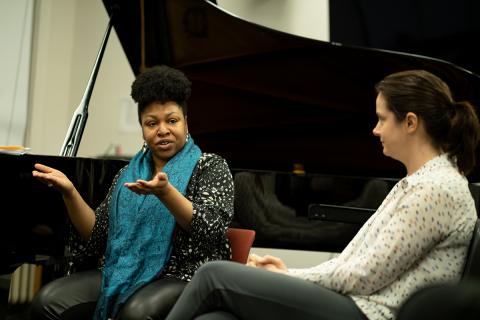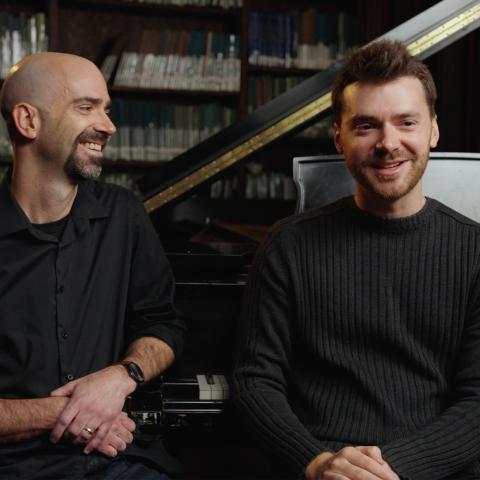Charenée Wade on Setting Boundaries and Creating Connections

Jazz and R&B vocalist Charenée Wade (left) sits for an interview with Kris Davis (right) from Berklee's Institute of Jazz and Gender Justice during a recent visit to campus.
Image by Alex Kawasaki
Singer, composer, arranger, and educator Charenée Wade was the latest guest of the Gathering, an ongoing series hosted by the Institute of Jazz and Gender Justice. In an interview moderated by Kris Davis, associate program director of creative development for the institute, Wade shared her professional journey and gave advice on finding the right musicians, choosing a setlist, and setting the right tone not just for a gig, but for a whole career.
With more than 15 years of industry experience and a deep passion for communicating the human experience, Wade has built her career by getting out there, showing up, and telling a great story. Whether gigging in a listening room, a bar, or a supper club, she always finds a way to engage with her audience through her energy and presence.
Forming a Band
When searching for band members that complement her vocal work, Wade seeks out musicians who can communicate with their audience through their performance. She says, "For me, the greatest players, the ones that I love to play with that I continue to call, are the ones who are listening to the story [of the music] intently and understand how to be a part of that storytelling through their instrument."
You have to bring [the audience] closer to you before you take them on [a] journey.
—Charenée Wade
Developing a Setlist
When asked how she develops a setlist, Wade kept coming back to the word “energy.” A musician’s energy, the energy of the space, and the energy of the listeners are all components of creating the right setlist, and setting the stage for a story. She added, “It’s your job to get their attention and then make a decision as to what comes next, after you’re holding the room in your hand. You have to bring them closer to you before you take them on the journey.”
Being in the Trenches
Wade knows what it’s like to perform day in and out, always reaching for the next gig and deciding what fee to charge (or accept). She recalled a conversation with trumpeter Cecil Bridgewater, who would always say, “There are three reasons to take a gig, and two out of three ain’t bad,” and she paraphrased those reasons as: It adds to your musical development and brings you joy; it helps you build your network or audience; and/or, "the money is just too good to pass up!"
Setting Boundaries
After hearing a question about what to do when facing disrespect or harassment, Wade answered, “What would you tell your 20-year-old self?” Nods of approval and understanding spread throughout the room. After reflection, she added, “Be willing to be more unapologetic—especially when someone is being disrespectful or crossing a boundary with you.” She sounded a note of hope in saying that, while musicians might have to keep establishing boundaries throughout a long career, asking for what you need does get easier.




